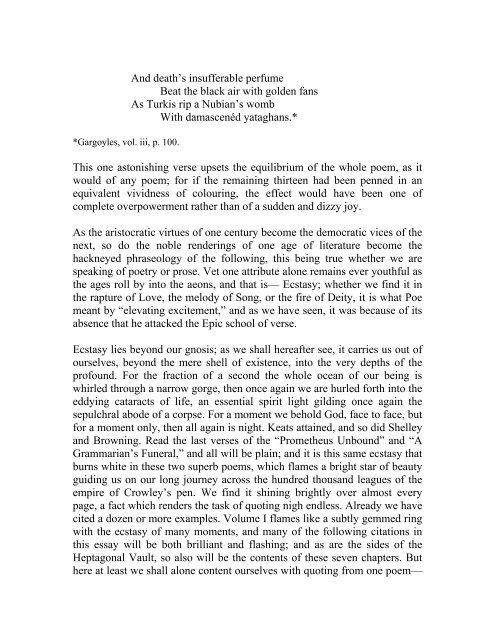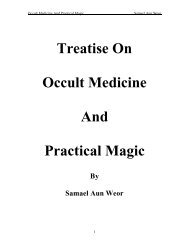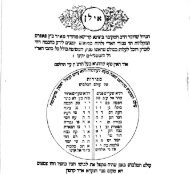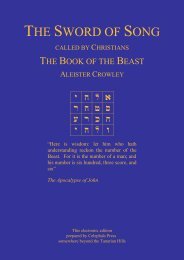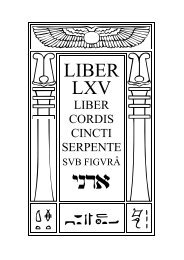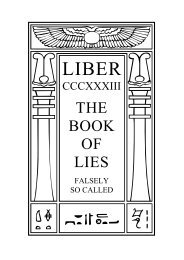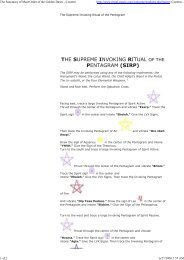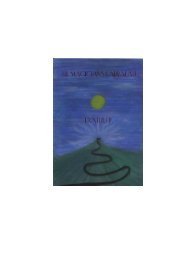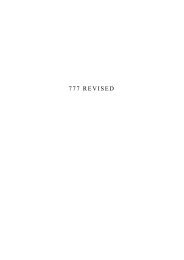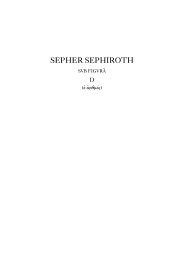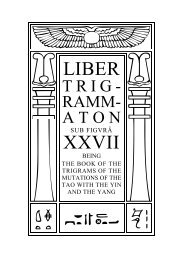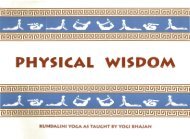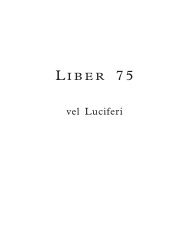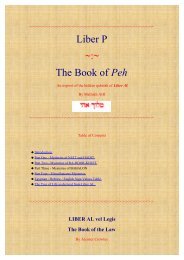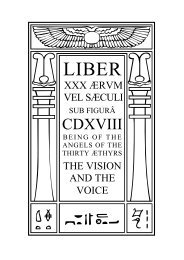Star In the West TNR.pdf - The Hermetic Library
Star In the West TNR.pdf - The Hermetic Library
Star In the West TNR.pdf - The Hermetic Library
You also want an ePaper? Increase the reach of your titles
YUMPU automatically turns print PDFs into web optimized ePapers that Google loves.
*Gargoyles, vol. iii, p. 100.<br />
And death’s insufferable perfume<br />
Beat <strong>the</strong> black air with golden fans<br />
As Turkis rip a Nubian’s womb<br />
With damascenéd yataghans.*<br />
This one astonishing verse upsets <strong>the</strong> equilibrium of <strong>the</strong> whole poem, as it<br />
would of any poem; for if <strong>the</strong> remaining thirteen had been penned in an<br />
equivalent vividness of colouring, <strong>the</strong> effect would have been one of<br />
complete overpowerment ra<strong>the</strong>r than of a sudden and dizzy joy.<br />
As <strong>the</strong> aristocratic virtues of one century become <strong>the</strong> democratic vices of <strong>the</strong><br />
next, so do <strong>the</strong> noble renderings of one age of literature become <strong>the</strong><br />
hackneyed phraseology of <strong>the</strong> following, this being true whe<strong>the</strong>r we are<br />
speaking of poetry or prose. Vet one attribute alone remains ever youthful as<br />
<strong>the</strong> ages roll by into <strong>the</strong> aeons, and that is— Ecstasy; whe<strong>the</strong>r we find it in<br />
<strong>the</strong> rapture of Love, <strong>the</strong> melody of Song, or <strong>the</strong> fire of Deity, it is what Poe<br />
meant by “elevating excitement,” and as we have seen, it was because of its<br />
absence that he attacked <strong>the</strong> Epic school of verse.<br />
Ecstasy lies beyond our gnosis; as we shall hereafter see, it carries us out of<br />
ourselves, beyond <strong>the</strong> mere shell of existence, into <strong>the</strong> very depths of <strong>the</strong><br />
profound. For <strong>the</strong> fraction of a second <strong>the</strong> whole ocean of our being is<br />
whirled through a narrow gorge, <strong>the</strong>n once again we are hurled forth into <strong>the</strong><br />
eddying cataracts of life, an essential spirit light gilding once again <strong>the</strong><br />
sepulchral abode of a corpse. For a moment we behold God, face to face, but<br />
for a moment only, <strong>the</strong>n all again is night. Keats attained, and so did Shelley<br />
and Browning. Read <strong>the</strong> last verses of <strong>the</strong> “Prome<strong>the</strong>us Unbound” and “A<br />
Grammarian’s Funeral,” and all will be plain; and it is this same ecstasy that<br />
burns white in <strong>the</strong>se two superb poems, which flames a bright star of beauty<br />
guiding us on our long journey across <strong>the</strong> hundred thousand leagues of <strong>the</strong><br />
empire of Crowley’s pen. We find it shining brightly over almost every<br />
page, a fact which renders <strong>the</strong> task of quoting nigh endless. Already we have<br />
cited a dozen or more examples. Volume I flames like a subtly gemmed ring<br />
with <strong>the</strong> ecstasy of many moments, and many of <strong>the</strong> following citations in<br />
this essay will be both brilliant and flashing; and as are <strong>the</strong> sides of <strong>the</strong><br />
Heptagonal Vault, so also will be <strong>the</strong> contents of <strong>the</strong>se seven chapters. But<br />
here at least we shall alone content ourselves with quoting from one poem—


